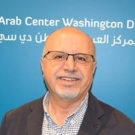Speakers

Ilana Feldman
Professor of Anthropology, History, and International Affairs
George Washington University

Zaha Hassan
Middle East Fellow
New America

Michael C. Hudson
Professor Emeritus of International Relations and Arab Studies
Georgetown University
Moderator
Event Summary
Washington, DC—May 8, 2018—Arab Center Washington DC (ACW) hosted a panel discussion on May 8, 2018 entitled “Nakba at 70: Palestinian Rights, Refugees, and Prospects for Just Peace” ahead of the 70th anniversary of the displacement and dispossession of the Palestinian people. ACW Executive Director Khalil Jahshan offered introductory remarks and a brief overview of the events of the ongoing Nakba. Panelists were Professor Ilana Feldman from George Washington University, Zaha Hassan of New America, Professor Shibley Telhami of the University of Maryland, and Professor Emeritus Michael C. Hudson from Georgetown University. Both Telhami and Hudson serve on ACW’s Academic Advisory Board.
Feldman said that at first, the fragmented Palestinian community sought refuge in neighboring Jordan, Syria, and Lebanon while many fled to today’s West Bank and Gaza Strip. She noted that each of these communities experienced different levels of social, political, and legal conditions. International aid groups have had to grapple with how best to manage humanitarian assistance in a situation that often rotates between chronic need and immediate crisis. Most notably, aid organizations have struggled with how to shift from saving lives and alleviating suffering to managing the long-term effects of improving the lives of refugees.
Hassan illustrated the dearth of international attention to the legal questions surrounding Palestinian displacement. The original United Nations Partition Plan (Resolution 181) allocated 55 percent of historic Palestine to the Jews; but the Israeli government continues to push Palestinians out of their homes. Israel is not forced to abide by international law to allow the Palestinians to voluntarily return and indeed displaced more Palestinians in multiple wars, annexed Palestinian land in the Occupied Territories, and built Jewish-only settlements on land originally allocated to Palestine.
Hudson said that the Zionist movement has found support at the top of the US executive and legislative branches since President Woodrow Wilson. Despite internal dissent within the State Department and other agencies, every president has soiled his hands on the Palestinian issue. To Hudson, President Donald Trump is the latest and most pro-Zionist American president.
Telhami said that prospects for the Palestinian return have declined over time because the leading narrative has shifted to Palestinian nationalism and statehood. He agreed with Feldman that refugees could refocus their energies on such issues as expanding the definition of refugee rights and defining humanitarian support as an international obligation, not as a charity.
Panelists agreed that both the Palestinian political leadership and the refugees themselves should garner additional international support for their cause. Hassan urged Palestinians to pursue justice to hold Israel accountable to international law. Hudson noted that American public opinion could be shifting, and this could offer Palestinians more support. Despite these recommendations, Telhami was pessimistic about the prospect of constructive developments that might enable Palestinian refugees to realize any positive changes in the near future.


